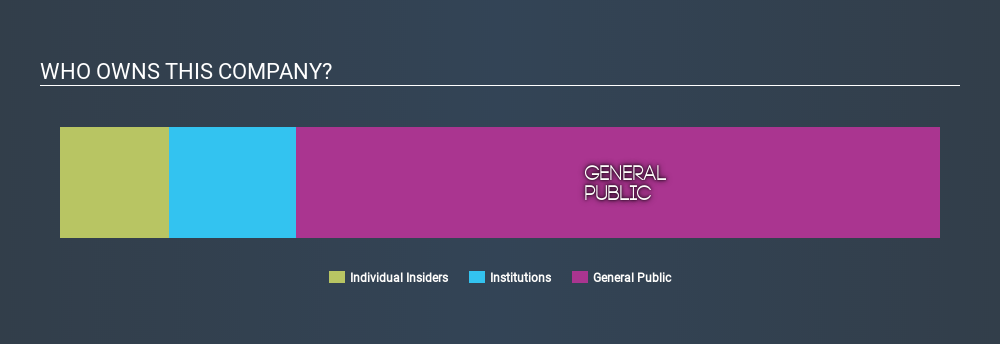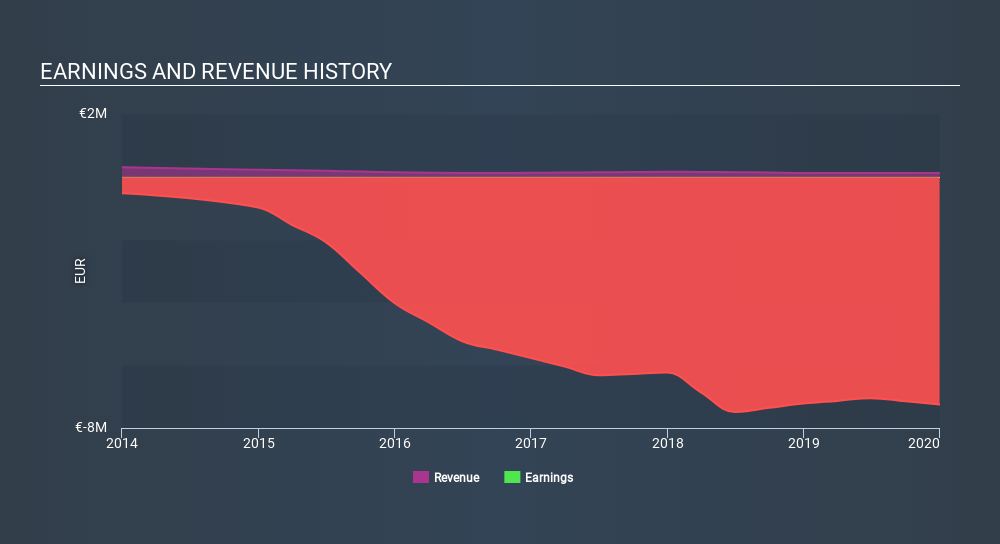
The big shareholder groups in Amoéba S.A. (EPA:AMEBA) have power over the company. Generally speaking, as a company grows, institutions will increase their ownership. Conversely, insiders often decrease their ownership over time. I quite like to see at least a little bit of insider ownership. As Charlie Munger said 'Show me the incentive and I will show you the outcome.
With a market capitalization of €11m, Amoéba is a small cap stock, so it might not be well known by many institutional investors. In the chart below, we can see that institutions own shares in the company. Let's delve deeper into each type of owner, to discover more about Amoéba.
Check out our latest analysis for Amoéba

What Does The Institutional Ownership Tell Us About Amoéba?
Many institutions measure their performance against an index that approximates the local market. So they usually pay more attention to companies that are included in major indices.
Amoéba already has institutions on the share registry. Indeed, they own 14% of the company. This can indicate that the company has a certain degree of credibility in the investment community. However, it is best to be wary of relying on the supposed validation that comes with institutional investors. They too, get it wrong sometimes. If multiple institutions change their view on a stock at the same time, you could see the share price drop fast. It's therefore worth looking at Amoéba's earnings history, below. Of course, the future is what really matters.

Amoéba is not owned by hedge funds. With a 13% stake, CEO Fabrice Plasson is the largest shareholder. The second largest shareholder with 4.7%, is Siparex Proximité Innovation, followed by Auriga Partners, with an ownership of 4.1%.
A deeper look at our ownership data shows that the top 7 shareholders collectively hold less than 50% of the register, suggesting a large group of small holders where no one share holder has a majority.
While studying institutional ownership for a company can add value to your research, it is also a good practice to research analyst recommendations to get a deeper understand of a stock's expected performance. As far I can tell there isn't analyst coverage of the company, so it is probably flying under the radar.
Insider Ownership Of Amoéba
While the precise definition of an insider can be subjective, almost everyone considers board members to be insiders. Management ultimately answers to the board. However, it is not uncommon for managers to be executive board members, especially if they are a founder or the CEO.
Insider ownership is positive when it signals leadership are thinking like the true owners of the company. However, high insider ownership can also give immense power to a small group within the company. This can be negative in some circumstances.
It seems insiders own a significant proportion of Amoéba S.A.. Insiders own €1.4m worth of shares in the €11m company. It is great to see insiders so invested in the business. It might be worth checking if those insiders have been buying recently.
General Public Ownership
The general public, who are mostly retail investors, collectively hold 73% of Amoéba shares. With this size of ownership, retail investors can collectively play a role in decisions that affect shareholder returns, such as dividend policies and the appointment of directors. They can also exercise the power to decline an acquisition or merger that may not improve profitability.
Next Steps:
While it is well worth considering the different groups that own a company, there are other factors that are even more important. Take risks, for example - Amoéba has 6 warning signs (and 2 which make us uncomfortable) we think you should know about.
Of course, you might find a fantastic investment by looking elsewhere. So take a peek at this free list of interesting companies.
NB: Figures in this article are calculated using data from the last twelve months, which refer to the 12-month period ending on the last date of the month the financial statement is dated. This may not be consistent with full year annual report figures.
If you spot an error that warrants correction, please contact the editor at editorial-team@simplywallst.com. This article by Simply Wall St is general in nature. It does not constitute a recommendation to buy or sell any stock, and does not take account of your objectives, or your financial situation. Simply Wall St has no position in the stocks mentioned.
We aim to bring you long-term focused research analysis driven by fundamental data. Note that our analysis may not factor in the latest price-sensitive company announcements or qualitative material. Thank you for reading.
About ENXTPA:ALMIB
Amoéba
Develops biological biocides for the prevention of microbiological risk for water, crop protection and health sectors.
Moderate with weak fundamentals.
Market Insights
Community Narratives





